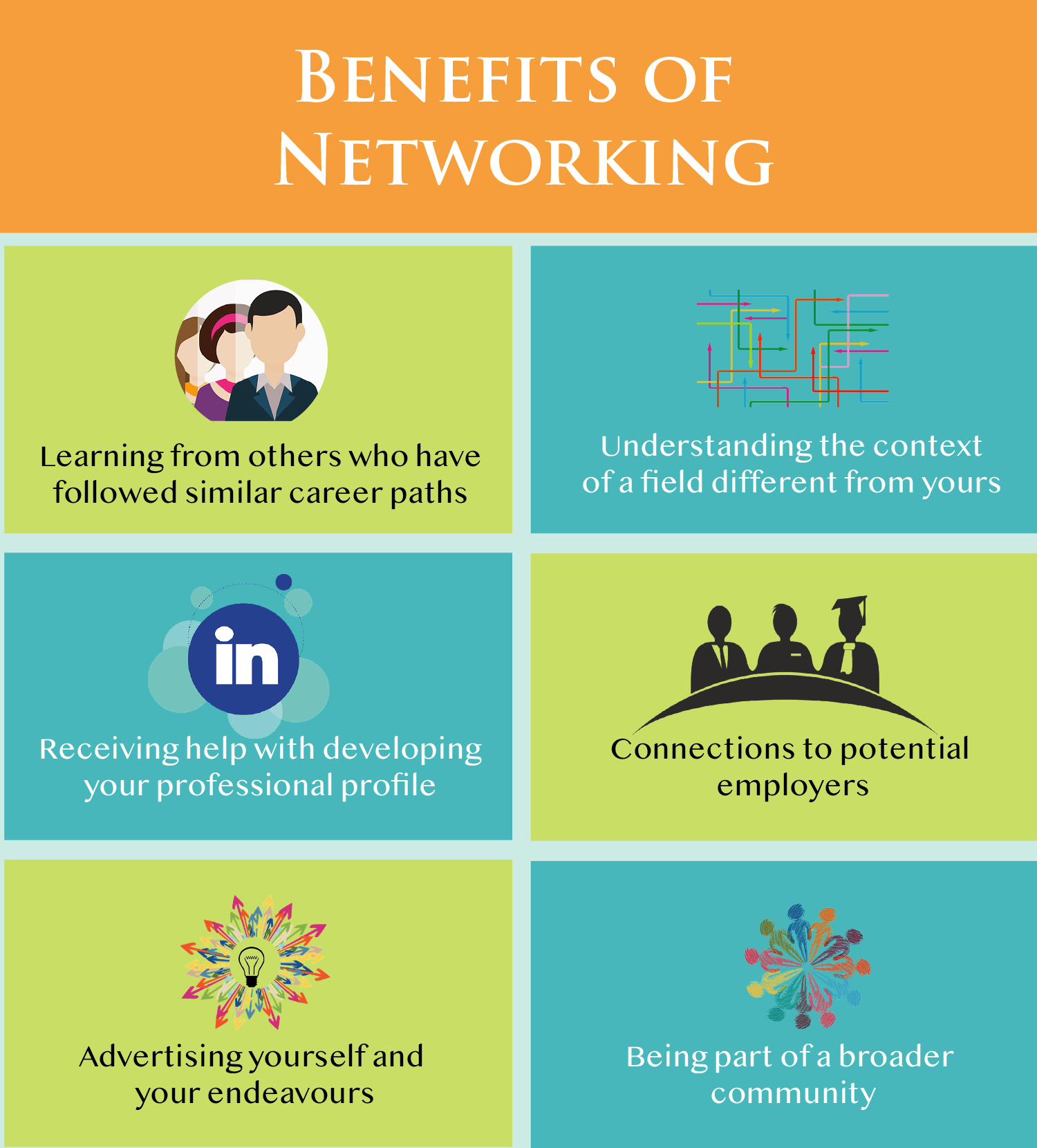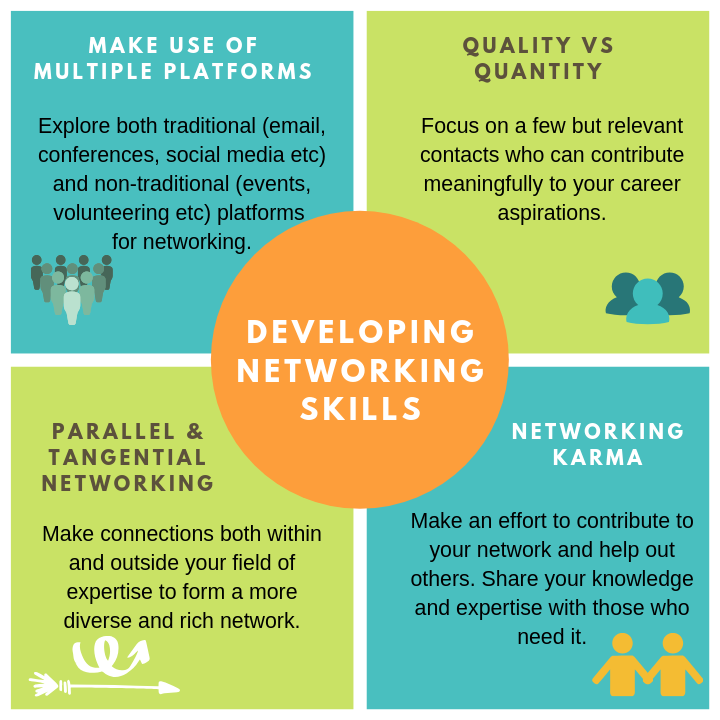In this next article in our series on networking in science, Siddharth Kankaria discusses how building and maintaining a strong professional network can aid the career development of scientists and science professionals both in and out of academia. In particular, he writes about how effective networking can make the process of transitioning to a new career path smoother and more efficient.

My career in science, albeit short, has already been influenced by networking in both tacit and definitive ways – helping me land summer internships, exposing me to several job opportunities, influencing the articulation of my Master’s dissertation topic, and most importantly, shaping my decision to transition from science to science communication.
The importance of networking in science is not a radically new idea by any means. Science is a collective, interactive, and collaborative process, and constantly requires scientists to exchange ideas with each other for designing better experiments, validating each other’s results, or seeking newer opportunities in the form of scientific positions, grants or research problems to work on.
However, with the rise of non-academic science careers, we are now able to better appreciate the many ways in which networking proves to be crucial for not only transitioning from academic to non-academic science careers, but also continuing to grow and excel in such careers.
How networking helps
Aditi Qamra completed her PhD in computational biology from the National University of Singapore (NUS), Singapore in Dec 2017 and moved to Toronto, Canada, soon afterward. Writing about her career transition story in an online networking & mentorship forum on Facebook, Qamra explains that although she enjoyed her PhD, she preferred a career in industry over academia. Not knowing much about the research & industry landscape of Toronto, she decided that a post-doctoral position was perhaps the best way to ease herself into the system. She was soon able to find a post-doctoral position in Toronto, but quickly realized that she was ill-prepared to take a plunge into the Canadian job market.
This was until Qamra decided to attend an informal meeting organized by the Career Support Group (CSG), a networking and mentorship forum run by PhD students and Post-docs, intended to mentor and support fellow Indian researchers. According to Qamra, networking within the Career Support Group (CSG) was instrumental in her learning about opportunities outside of academia. It also exposed her to legal considerations about working in Canada that she was unaware of.
Ananda Ghosh, one of the founding members of CSG, echoes this sentiment and feels that networking is especially crucial for STEM graduates, since many of them may not even be aware of the diversity of science careers outside of academia.
Why network?
Most non-academic science careers require a different set of skills from those visibly used in a laboratory. Sometimes they may demand acquiring completely new skills, while at other times, one can benefit from the tactical repurposing of skills acquired during a research career in innovative ways to suit the requirements of a new job.
It is in this phase of transitioning and repurposing one’s skills that networking can be very useful. For instance, talking to people who have already made such transitions can be a source of precious experiential knowledge. Similarly, networking can be very useful for understanding the context, guidelines, and rules of engagement in general when switching to a different field.
Qamra benefitted in multiple ways from her networking interactions at CSG.“They helped me improve my resume, my LinkedIn profile, taught me how to connect with potential employers, ask for informational interviews and were always just a message away at all steps of the process,” she explains in her Facebook post.
Further, networking can be a great tool to advertise yourself or your new endeavours. It can help connect you with interested investors or potential collaborators. It can also be a great way to acquire feedback and refine one’s idea, venture, or even streamline the direction of transition from academia to other science careers.
“I realized after 15 years in academia that I was never aware of the job market in academia, meaning of good mentors, understanding the real meaning of a PhD training, ethics in science, diversity, non-academic careers, work-life balance and abuse in academia,” says Ghosh, stating that this was one of the motivations behind him co-founding CSG along with Abhinav Dey, another alumnus of Indian Institute of Science (IISc).
Sometimes, it might be worthwhile to network just for the sake of being a part of unique networking, capacity-building, and mentorship forums like Career Support Group, IndiaBioscience, and Centre for Cellular and Molecular Platforms (C‑CAMP). It could also be an excellent way to make nodal contacts, who can then connect you to relevant people.
Qamra strongly feels that networking is key to navigating the landscape of non-academic science careers. “Only through connecting with people from diverse backgrounds, can one learn about the array of possibilities available as well as the requirements/challenges that come along with the role. This information is not taught in graduate schools and also not readily available online,” she says.

Developing networking skills
Good networking requires genuine effort on the part of the individual as well as inculcating certain skills which can be practiced and honed over time.
Making use of multiple platforms
There are several conventionally accepted ways to network with people, be it through websites, social media platforms, emails, official meetings, and conferences, or specifically designed networking events. However, there are also many unconventional ways to network, like volunteering, meeting people at cultural and social events, or niche networks built especially for allowing people to discuss field-specific problems. Talking about the success of CSG, Ghosh felt that, “Social media, if used wisely, can be a great tool for networking and education in today’s globalized world, where ‘real’ networks are very very dynamic.”
Quality vs. quantity
It is equally important to not get lost in the flood of social media networks and contacts. Effective networking requires personalised two-way communication and relationship building. The mantra of networking today is not quantity but quality – instead of trying to reach out and connect to hundreds of potential contacts, it’s better to trim your network and focus on a few but relevant contacts who can contribute meaningfully to your career aspirations in the form of opportunities, advice, mentorship, and further networking leads.
Stressing on the importance of nurturing your networks over time, Qamra explains in her Facebook post that it is very important to thank your network, since “at the end of the day, roles and companies might change but the network is going to remain the same”.
Parallel and Tangential Networking
It is also important to remember that it is equally important to network with people who are in similar occupations (parallel networking) and people who are in radically different ones (tangential networking). People in the same field as you, or in a field in which you aspire to be, can guide you on the specifics of a career in their respective fields and may be a great source of niche domain knowledge.
On the other hand, people in completely different fields can be a great way to not only connect with people with very different experiences, viewpoints, and reach, but also forge unusual collaborations and expose yourself to rare but meaningful opportunities that could help boost your career.
Networking karma
The idea of networking karma is simple — if you contribute honestly and offer advice and help to others, you have a much greater chance to receive the benefits of networking yourself. In this regard, it is important to remember that the power of networking is exerted not just in a vertical fashion from a mentor to a mentee, but also in a horizontal fashion from experts in one field to another. It is crucial that you try and enable other people in your network, contribute back to the network as much as you can.
It also helps if you make yourself visible in your field of networks as someone who is able to use their area of expertise to influence people. Eventually, you will be able to build much stronger networks if you are approachable, valuable, willing to help people in your network, and ready to share your knowledge and expertise, expose others to potential opportunities to benefit from.

Looking back
The power of networking is quite evident in the example of CSG. Running for about 4 years now, it has already facilitated more than 100 successful career transitions and has led to a sharp rise in awareness about non-academic science careers. Moreover, it is also serving as a great forum to discuss social issues like life in academia, mental health issues, and how to choose better mentors, to name just a few.
“We have seen members finding a niche of their own and becoming field leaders,” says Ghosh. He also mentions about newly initiated STEMpeers Fellows Program, which encourages students and postdocs to not only pursue high-quality research, but also grooms them for becoming leaders in science communication, [science] illustration, community development, and social entrepreneurship.
Ghosh signs off, “Networking helps with understanding job types, how one can transition, [and] gives a chance to showcase your inner strengths. Every network is an opportunity in waiting!”
Did you enjoy this article? Please let us know in the comments below.